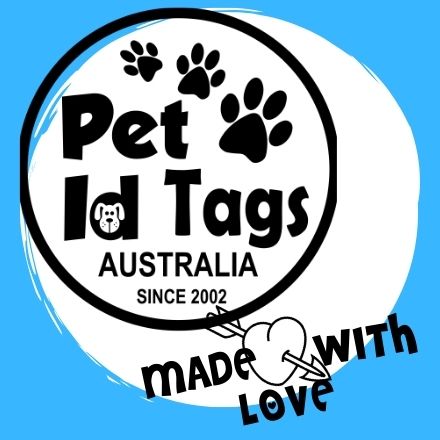As a pet owner, you want to do everything in your power to ensure your furry friend's safety and well-being. One simple yet crucial step is equipping them with a pet ID tag. In the unfortunate event that your pet gets lost, a tag attached to their collar can be the very thing that brings them home. In this article, we'll delve into why personalized pet ID tags are a must-have for every pet parent, how to choose the right one, and the peace of mind they bring.
Why Pet ID Tags Are Essential
Quick Recovery of Lost Pets
The primary purpose of a pet ID tag is to facilitate the quick return of a lost pet. When someone encounters a stray animal, the first thing they'll likely check is the collar for any identification. A tag with the pet's name and your contact information dramatically increases the chances of a speedy reunion.
Legal Requirements
In many places, the law requires pets to wear identification. It's not just about having a microchip – visible ID is mandatory. While microchip registration is crucial, a pet ID tag provides immediate access to your contact details without the need for a scanner.
Peace of Mind
Knowing that your pet carries identification can provide significant peace of mind. Should they slip out of the house or yard, anyone who finds them can quickly get in touch with you, reducing the time your pet spends lost and alone.

by Hyunwon Jang (https://unsplash.com/@hyunwonjang)
Choosing the Right Pet ID Tag
Personalized pet ID tags come in various shapes, sizes, and materials. When selecting one for your pet, there are several factors to consider.
Material Durability
The most common materials for pet ID tags are stainless steel, aluminum, brass, and plastic. Stainless steel and brass are highly durable and resistant to rust and corrosion, making them excellent choices for active pets or those that spend a lot of time outdoors.
Readability
Ensure the font size and style on the tag are clear and easy to read. The text should include your pet's name, your phone number, and any other pertinent information like medical needs or if your pet is microchipped.
Size and Weight
Choose a tag that is appropriately sized for your pet. A tag too large can be bothersome for small pets, while a small tag on a large dog may be difficult to notice.
Personal Style
Custom cat tags and personalized dog tags also offer an opportunity to showcase your pet's personality. From classic to quirky designs, you can select a tag that compleates your pet's unique character.
The Role of Technology in Pet ID Tags
Technology has revolutionized pet identification, with QR-coded tags and GPS-enabled collars offering advanced ways to keep track of your pet.
QR-Coded Tags
Some modern pet ID tags feature a QR code that, when scanned by a smartphone, provides access to a web page with your contact information and additional details about your pet.
GPS Collars
GPS technology allows pet owners to track their pet's location in real-time using a smartphone app. While more expensive, these devices offer an extra layer of security, especially for pets that are prone to wandering.
Personalized Pet ID Tags: More Than Just a Name
Custom pet ID tags can include more than just your pet's name and your phone number. Consider adding information that could be crucial in an emergency.
Medical Information
If your pet has a medical condition or is on medication, including this information on the tag can alert anyone who finds them to their special needs.
Reward Offer
Some pet owners choose to include the mention of a reward on the tag to incentivize the finder to contact them.
Multiple Contact Numbers
It's wise to include more than one phone number on the tag, in case you're not immediately reachable. Consider adding a backup contact, such as a family member or close friend.

by Roberto Nickson (https://unsplash.com/@rpnickson)
Beyond the Tag: Microchipping and Registration
While pet ID tags are indispensable, pairing them with a microchip and ensuring it's registered and up-to-date provides an additional layer of protection for your pet.
The Importance of Microchipping
A microchip is a permanent form of identification that can't be lost or damaged. Veterinary clinics and animal shelters can scan for a microchip to retrieve your contact information from a national database.
Keeping Information Up-to-Date
Always update your pet's microchip registration if you move or change phone numbers. The same goes for the information on their ID tag.
How to Get Personalized Pet ID Tags
Personalized pet ID tags are widely available and can be ordered from various sources.
Pet Stores
Many pet stores offer on-the-spot engraving services for pet ID tags, providing convenience and instant gratification.
Online Retailers
Websites specializing in pet products often have a wider range of customizable options for pet ID tags, including different fonts, colors, and graphics.
Veterinary Clinics
Some vet clinics also provide pet ID tags and can assist you in choosing the right one for your pet's needs.
Conclusion: Don't Wait Until It's Too Late
The importance of equipping your pet with a personalized ID tag cannot be overstated. It's a simple, cost-effective measure that could mean the difference between losing your pet forever and having them safely returned to you. Whether you opt for a classic engraved tag or a tech-enhanced version, the peace of mind it offers is invaluable. Ensure that every pet in your care wears a tag—it's a small step that can have a huge impact.

by Ricky Kharawala (https://unsplash.com/@sweetmangostudios)
